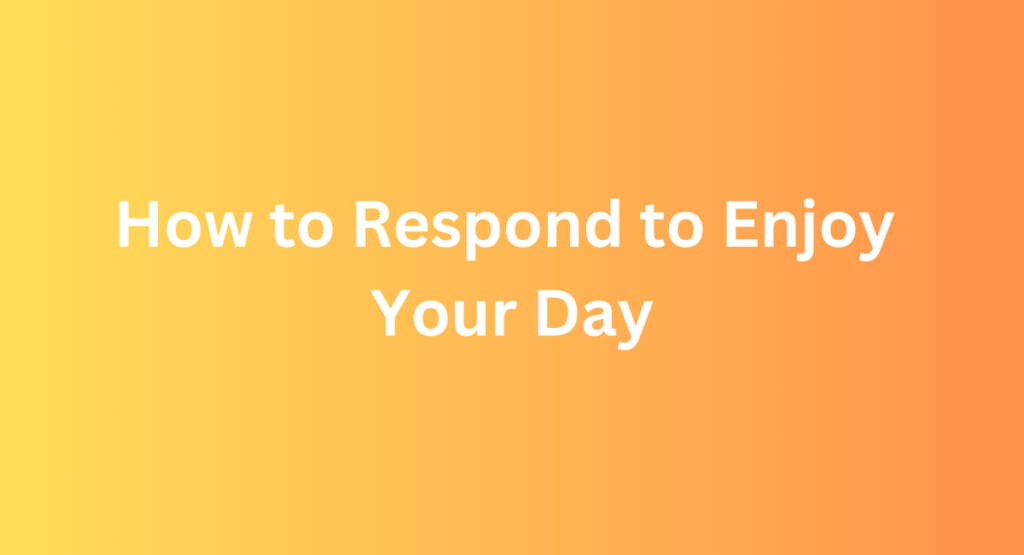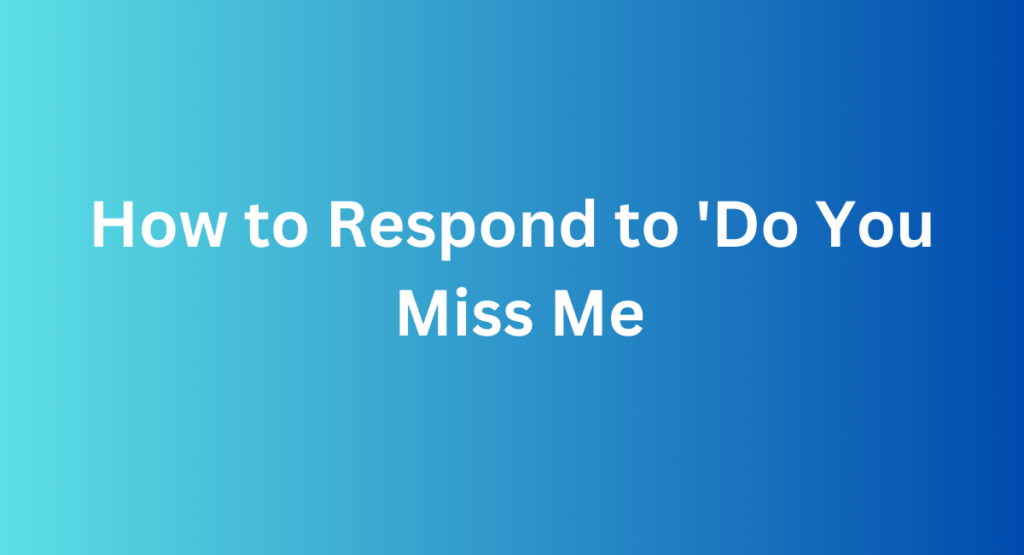To respond to “take care,” say “You too,” “Thanks, you too,” or “Will do.” When someone tells you to take care, it’s a polite way of expressing concern for your well-being.
Acknowledge their kind words with a simple and friendly response to show appreciation. In various social settings, such as casual conversations, text messages, or emails, the phrase “take care” is often used as a way to bid farewell or express caring sentiments.
Knowing how to respond appropriately can help maintain positive interactions and strengthen relationships. By understanding the significance of this common expression and responding with warmth and gratitude, you can navigate social interactions smoothly and leave a positive impression on others. Let’s explore some effective ways to respond to “take care” in different contexts.
How To Respond To Take Care
Responding to someone saying “take care” is as important as receiving the message itself. It’s best to reciprocate the sentiment by saying “you too” or “thank you, you too” – expressing your genuine concern for their well-being.
When someone says “take care”, it’s a common courtesy that conveys their concern for your well-being. It’s essential to respond appropriately to acknowledge their sentiment. Here are some ways to respond to “take care”.
Ways To Respond To “Take Care”
- Thank you, I will.
- You too, take care.
- I appreciate it, thanks.
- Will do that, thanks for caring.
- Thanks, I’ll keep that in mind.
Responding to “take care” is a small yet meaningful gesture that reflects your appreciation for the other person’s consideration. It’s a simple way to acknowledge someone’s goodwill and reciprocate the sentiment positively.
Take Care Meaning
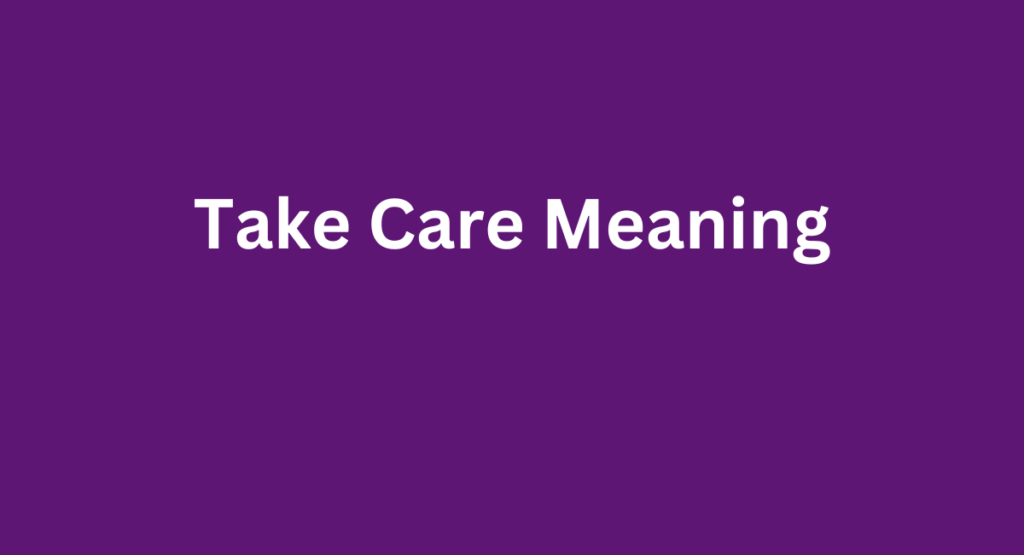
When someone says “take care,” it’s a kind way of expressing concern for your well-being. A suitable response would be to reciprocate the sentiment by saying “You too” or “Thanks, you as well. ” It’s a simple way to show appreciation and acknowledge the sentiment.
Understanding The Meaning Of “Take Care”
When someone says “take care” to you, it is more than just a casual farewell. It carries a deeper sentiment of concern and goodwill. Here’s how to interpret and respond to this common phrase.
Interpreting The Phrase
- Expression of Care: “Take care” is a way for the speaker to show genuine concern for your well-being. It’s a subtle reminder that they value your safety and happiness.
- Wish for Safety and Health: This phrase conveys the hope that you stay safe, healthy, and well in whatever you do.
- Emotional Support: Saying “take care” is also a way for someone to express emotional support and comfort towards you in times of need.
Responding To “Take Care”
- Acknowledging the Sentiment: You can respond to “take care” by thanking the person for their kind words and acknowledging the care they have shown.
- Reciprocating the Sentiment: In return, you can reciprocate the sentiment by saying, “You too,” or “You take care as well,” to show that you also care about their well-being.
- Expressing Gratitude: Another way to respond is by expressing gratitude and letting the person know that you appreciate their concern.
Remember, “take care” is not just a simple phrase; it reflects genuine care and well-wishes from the speaker. So, next time someone says it to you, embrace the sentiment and respond with warmth and gratitude.
Best Respond To Take Care Message
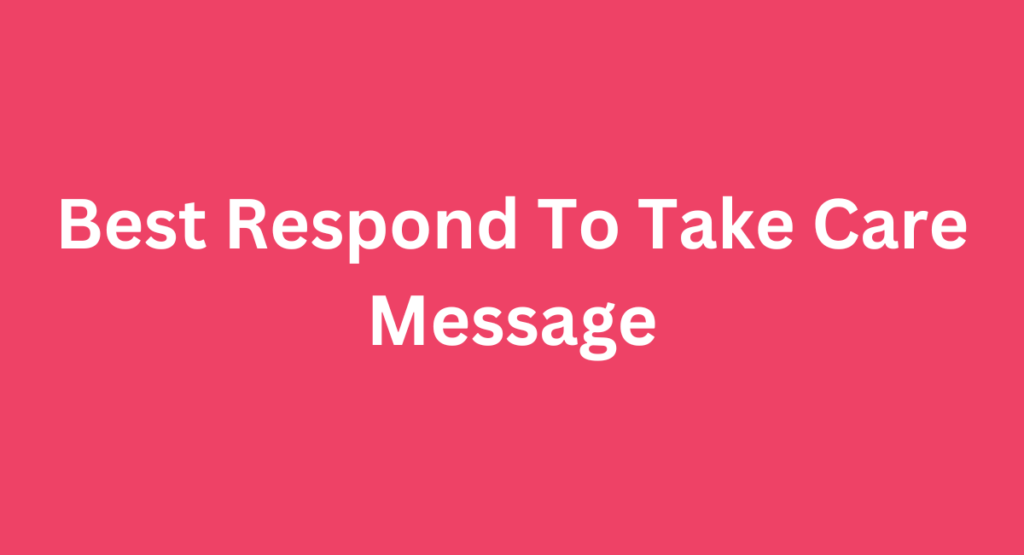
Show your gratitude for the sentiment by replying “You too” or “Thanks, you as well”. A simple and considerate response to a ‘Take Care’ message shows sincerity and caring.
Best Ways To Respond To “Take Care” Messages
- Express your appreciation:
- Thank the sender for their well wishes and express gratitude.
- Return the sentiment:
- Respond by saying “You too” or “Take care as well” to reciprocate the sentiment.
- Include a positive closing:
- End your response with a friendly remark to leave a positive impression.
- Suggest future contact:
- If appropriate, suggest meeting up or having another conversation soon.
– “Thank you! I appreciate your thoughtfulness.”
– “I will take care. Thanks for reminding me.”
– “Your concern means a lot. I’ll make sure to take care.”
– “Thanks! I’ll be sure to look after myself.”
– “I’ll keep that in mind. Thanks for caring!”
– “I promise to take care. Thanks for your kind words.”
– “I’ll do my best to take care. Thanks for the reminder.”
– “Your message warmed my heart. I’ll take good care, promise!”
– “Thank you! Your words encourage me to prioritize self-care.”
– “I’m touched by your concern. I’ll make sure to take care of myself.”
Take Care Reply To Friend

When responding to “take care” from a friend, show appreciation and reciprocate the sentiment to nurture the relationship. A simple “You too!” Or “Thank you, you too!” Conveys care and strengthens the bond. Sharing mutual well-wishes fosters a positive connection.
Providing A Genuine Take Care Reply To A Friend
Responding to a friend’s “take care” message can be a meaningful way to show you care for them. Whether in person, over the phone, or through a message, conveying your gratitude and well wishes is important. Here are some effective ways to respond to your friend’s “take care” gesture:
Expressing Appreciation
- Thank your friend: Let them know how much you appreciate their concern for your well-being.
- Show gratitude: Express how thoughtful it is of them to think of you and wish you well.
Sharing Well Wishes
- Return the gesture: Offer your good wishes to your friends, ensuring them of your care and concern.
- Show empathy: Show understanding and support, particularly if your friend is going through a challenging time.
Suggesting Future Plans
- Propose a get-together: Discuss the possibility of catching up soon to continue the relationship and strengthen your bond.
- Discuss a shared interest: Plan an activity that you both enjoy to spend quality time together.
– “Thanks, friend! You take care too, and let’s catch up soon.”
– “I appreciate your concern, buddy! I’ll make sure to take care of myself.”
– “Thanks for looking out for me, pal! You’re the best. I’ll take care, promise.”
– “Your friendship means the world to me. I’ll be sure to take care. Take care as well!”
– “Thanks for the reminder, mate! I’ll make self-care a priority. You do the same!”
– “Thank you for caring, my friend! I’ll take care and keep you updated. Let’s hang out soon!”
– “I’m lucky to have a friend like you. I’ll take care, and we’ll catch up soon!”
– “Your friendship is a constant source of support. I’ll take care and cherish our bond.”
– “I’m grateful for your friendship. I’ll make sure to take care of myself. Take care too!”
– “Thank you for always being there, friend! I’ll take care and look forward to more adventures with you.”
Responding to your friend’s “take care” message is an opportunity to strengthen your friendship and let your friend know that you value their concern.
Take Care Reply To Wife

In responding to “take care” from your wife, you can express your gratitude and reciprocate the sentiment by saying “You too, honey” or “I will, thank you. Love you. ” It’s a simple way to show you care for her well-being and appreciate her concern.
Taking care of your wife is an essential aspect of a healthy and fulfilling relationship. When she tells you to take care, it’s important to respond in a way that shows your love, support, and willingness to meet her needs.
Here are some ways to reply when your wife says “take care”:
Acknowledge Her Concern:
- Let her know that you appreciate her concern and care for you.
- Assure her that you will prioritize your well-being.
Express Your Gratitude:
- Thank her for her love and thoughtfulness.
- Let her know that her words mean a lot to you.
Reassure Her Of Your Commitment:
- Assure her that you will take the necessary steps to maintain your health and well-being.
- Share your plans to prioritize self-care.
Communicate Your Love And Care:
- Express how much you value her support and concern for you.
- Let her know that taking care of yourself ensures you can be there for her in the best possible way.
Share Your Action Plan:
- Inform her about the specific actions you’ll take to take care of yourself.
- Discuss any lifestyle changes, such as exercise or healthier eating habits, that you intend to adopt.
– “Thank you, sweetheart. I’ll take care of myself for you. Love you.”
– “I appreciate your concern, my love. I’ll be sure to take care. Love you lots.”
– “Thanks, darling. Your care means everything to me. I’ll take care and come back to you safely.”
– “I’m grateful for your love and care, my dear. I promise to take care of myself. Love you endlessly.”
– “Thank you for always looking out for me, my love. I’ll take care and be back home to you soon. Love you.”
– “Your love and concern touched my heart, my dear wife. I’ll take care for you. Love you more than words can say.”
– “Thanks for your love and support, my dear. I’ll take care of myself and come back to you soon. Love you forever.”
– “I’m blessed to have you as my wife, caring for me always. I’ll take care and cherish our love. Love you endlessly.”
– “Thank you for always being there for me, my love. I’ll take care and make sure to come back to your loving arms. Love you deeply.”
– “Your care is my strength, my darling wife. I promise to take care and return to you safely. Love you beyond measure.”
Remember, open and honest communication is the key to a strong and healthy relationship. By responding to your wife’s “take care” with understanding and sincerity, you can strengthen the bond between you and show her that you genuinely care about her concerns.
Take Care Reply To Your Husband

Taking care of your husband means responding in a thoughtful and caring manner. Show your love by actively listening, offering support, and expressing your concern for his well-being. Your reply should reflect genuine empathy and understanding.
When your husband tells you to take care, it’s not just a simple phrase. It’s a reminder of his love and concern for your well-being. Responding thoughtfully can strengthen your bond and show him that you appreciate his care. Here are some ways to reply to your husband when he says “Take care”:
Show Gratitude With Your Words
- Thank him for his thoughtfulness: Let him know that you acknowledge his concern and appreciate that he wants you to take care of yourself.
Affirm Your Love And Care
- Reassure him of your feelings: Share your love and care for him in return, assuring him that you also want him to take care of himself.
Express Your Plans For Self-care
- Share your self-care routine: Talk about the steps you’re taking to ensure your well-being, such as engaging in self-care activities, getting enough rest, and maintaining a healthy lifestyle.
Offer Mutual Support
- Encourage open communication: Use this opportunity to remind him that both of you are there to support each other and that you value his well-being too.
– “Thank you, my love. I’ll take care and get back to you soon. Love you.”
– “Your concern means the world to me, sweetheart. I’ll take care and return to your loving arms. Love you endlessly.”
– “I appreciate your love and care, my dear husband. I promise to take care of myself for you. Love you deeply.”
– “Thanks, darling. Your support gives me strength. I’ll take care and come back home to you soon. Love you.”
– “Your words warm my heart, my dear husband. I’ll take care and cherish our bond. Love you more than words can express.”
– “I’m grateful for your love and care, my love. I’ll take care and get back to you soon. Love you endlessly.”
– “Thank you for always being my rock, my dear husband. I’ll take care and come back to you safely. Love you beyond measure.”
– “Your care fills me with warmth, my love. I promise to take care and return to you soon. Love you deeply.”
– “Thanks for always looking out for me, my dear husband. I’ll take care and make sure to come back to your loving embrace. Love you endlessly.”
– “Your love and support mean everything to me, my darling. I’ll take care and be back to you soon. Love you more each day.”
Remember, when your husband tells you to take care, it’s an expression of his love and concern. Respond with gratitude, affirm your love, express your self-care plans, and offer mutual support. Open communication and showing appreciation for each other’s well-being can deepen your connection and strengthen your relationship.
Take Care Reply To Teacher

Discover effective ways to respond when someone tells you to “take care,” whether it’s a teacher or any other person. Learn how to give a thoughtful reply that shows appreciation and conveys genuine concern.
Responding to your teacher when they say “Take care” can be a bit tricky as you want to maintain a respectful yet appropriate tone. Here are some effective ways to reply to your teacher when they tell you to take care:
Acknowledge And Appreciate
- Show your appreciation for your teacher’s concern by acknowledging their sentiment.
- Example: “Thank you, I will make sure to take good care of myself.”
Express Respect And Gratitude
- Express respect for your teacher’s well wishes and show your gratitude for their caring words.
- Example: “I appreciate your concern and will take care.”
Polite Assurance
- Politely assure your teacher that you will heed their advice and look after yourself.
- Example: “I will take care, thank you for your kind words.”
– “Thank you for your kind words, teacher. I’ll take care and continue to work hard. Your guidance means a lot.”
– “I appreciate your concern, dear teacher. I’ll make sure to take care and prioritize my well-being. Thank you for your support.”
– “Your care and encouragement motivate me, teacher. I’ll take care and strive to excel. Thank you for believing in me.”
– “Thanks for your reminder to take care, teacher. I’ll make self-care a priority. Your guidance is invaluable.”
– “I’m grateful for your support, teacher. I’ll take care and keep working towards my goals. Thank you for your wisdom.”
– “Your words of wisdom inspire me, teacher. I’ll take care and remember your advice. Thank you for guiding me.”
– “Thank you for your concern, teacher. I’ll take care and ensure to maintain a healthy balance. Your mentorship is cherished.”
– “Your care for your students is truly appreciated, teacher. I’ll take care and strive to meet your expectations. Thank you for your guidance.”
– “I’m thankful for your support, teacher. I’ll take care and apply myself diligently. Your encouragement means a lot.”
– “Your guidance has been invaluable, teacher. I’ll take care and continue to grow. Thank you for your care and dedication.”
Remember, the key is to maintain a respectful and appreciative tone in your response to your teacher while acknowledging their care and concern.
Funny Reply To Take Care

Sure! When someone says “Take care,” a funny reply could be “I’ll try not to trip over my own feet this time!” It adds a playful and lighthearted touch to the conversation while acknowledging the well-wisher’s concern.
Funny Reply To “Take Care”
- Responding to someone who says “Take care” can be an opportunity to inject some humor into the conversation. Here are a few witty replies you can consider:
- “Thanks! I’ll be as careful as a cat walking on ice cream. “: This lighthearted response adds a touch of whimsy to the typical “take care” exchange.
- “You too, and remember, safety first – unless it’s about those tacos! “: Infusing a playful twist with a reference to tacos can bring a smile to the recipient’s face.
- “I’ll try my best, but no promises – I’m a professional at stubbing toes! “: Making light of potential clumsiness can turn a mundane farewell into a memorable moment of laughter.
- “Got it! I’ll be as cautious as a squirrel crossing the road during rush hour. “: Comparing your carefulness to a squirrel’s navigation skills can add a humorous touch to the conversation.
- “Will do! I’ve stocked up on bubble wrap just in case. “: This response humorously implies a commitment to physical safety playfully and amusingly.
– “Thanks! I’ll be as careful as a cat walking on a tightrope.”
– “You bet! I’ll try not to trip over my shoelaces.”
– “Absolutely! I’ll wrap myself in bubble wrap just to be safe.”
– “Roger that! I’ll wear a helmet indoors and carry a ‘caution: clumsy person’ sign.”
– “Sure thing! I’ll try not to get into any ninja battles in the kitchen.”
– “Thanks! I’ll watch out for rogue squirrels and flying frisbees.”
– “No worries! I’ll try not to spontaneously combust or trip over invisible obstacles.”
– “Got it! I’ll be as cautious as a bull in a china shop… wait, maybe not that cautious.”
– “Will do! I’ll make sure to avoid any banana peels and slippery slopes.”
– “Thanks for the reminder! I’ll wear my ‘handle with care’ sticker proudly.”
Remember, the key is to keep the humor light and tailored to the individual’s personality while responding to a simple “take care. ” Enjoy the opportunity to brighten someone’s day with a touch of wit!
Rude Reply To Take Care
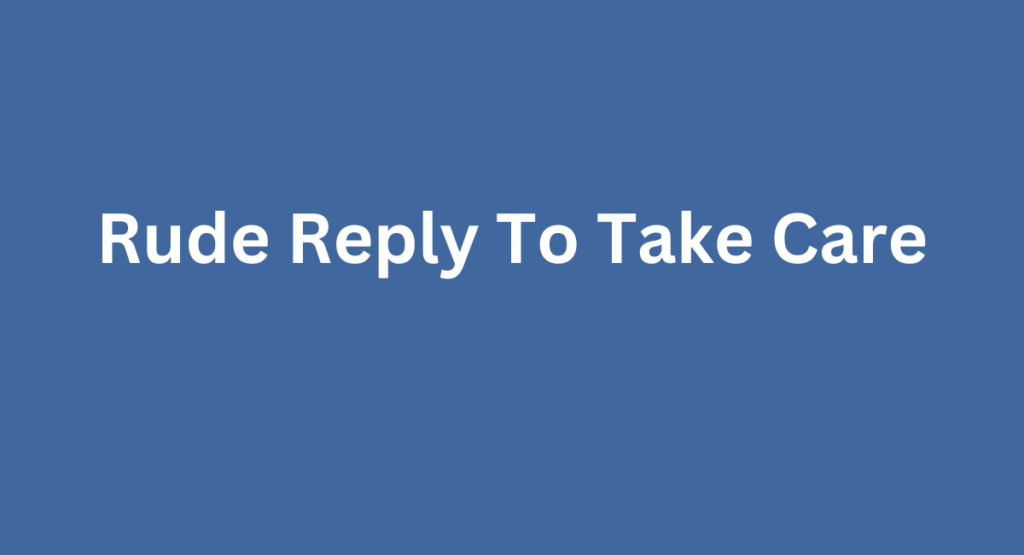
When someone tells you to “take care,” a rude reply is not necessary. It’s best to respond politely and positively, such as with a simple “thank you” or “you too. ” This shows respect and maintains a friendly interaction.
How To Respond To Take Care – Rude Reply To Take Care
Life is full of interactions, some pleasant and some not-so-polite. One such common phrase encountered is “take care. ” While it is usually meant with good intentions, there are times when a rude reply to “take care” may be warranted.
Here’s how you can navigate this situation with grace:
Strategies For Handling A Rude Response To “Take Care”:
- Brush it off: Sometimes, the best response to rudeness is to ignore it altogether. By not engaging with the negativity, you maintain your peace of mind.
- Redirect the conversation: Politely steer the conversation in a different direction to diffuse the tension. This can help shift the focus away from the rude remark.
- Respond with kindness: Counteract rudeness with kindness. Express your well wishes sincerely, despite the initial negativity.
- Set boundaries: If the rudeness persists, calmly assert your boundaries. Let the other person know that such behavior is not acceptable.
In situations where a rude reply to “take care” is received, remember to respond with composure and tact. Your reaction reflects your character, so choose grace over giving in to impoliteness.
Polite Response To Take Care
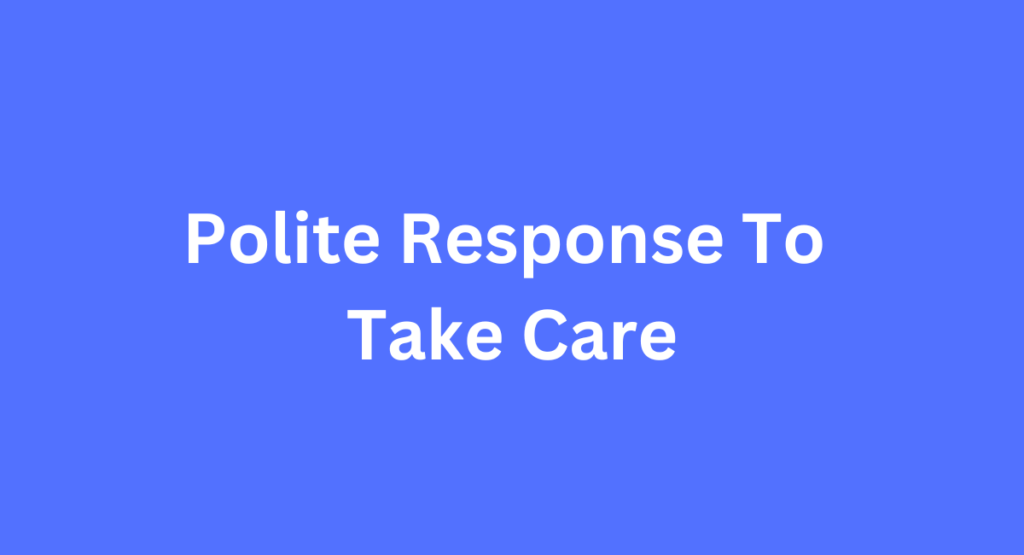
Responding with a simple “You too” or “Thanks, you too” is a polite acknowledgment of a “take care” message. It shows consideration and kindness in return.
Polite Response To “Take Care”
When someone says “take care,” it’s common to respond with a polite acknowledgment. You want to express your gratitude while reciprocating the sentiment. Here are some polite responses you can use to acknowledge the well-wishes:
- “Thank you, you too! “: This response shows appreciation while also wishing the other person well in return.
- “Thanks, I will. You take care as well! “: This response acknowledges the concern and expresses your intention to heed the advice.
- “I appreciate it, you do the same! “: This response conveys gratitude and reciprocates the sentiment by wishing the other person well.
- “Thanks, and likewise! “: This response affirms the gratitude for the well-wishes and extends the same sentiment back to the other person.
Each of these responses accomplishes the goal of acknowledging the care expressed by the other person while reciprocating the sentiment with a polite and genuine reply.
Friendly Response To Take Care
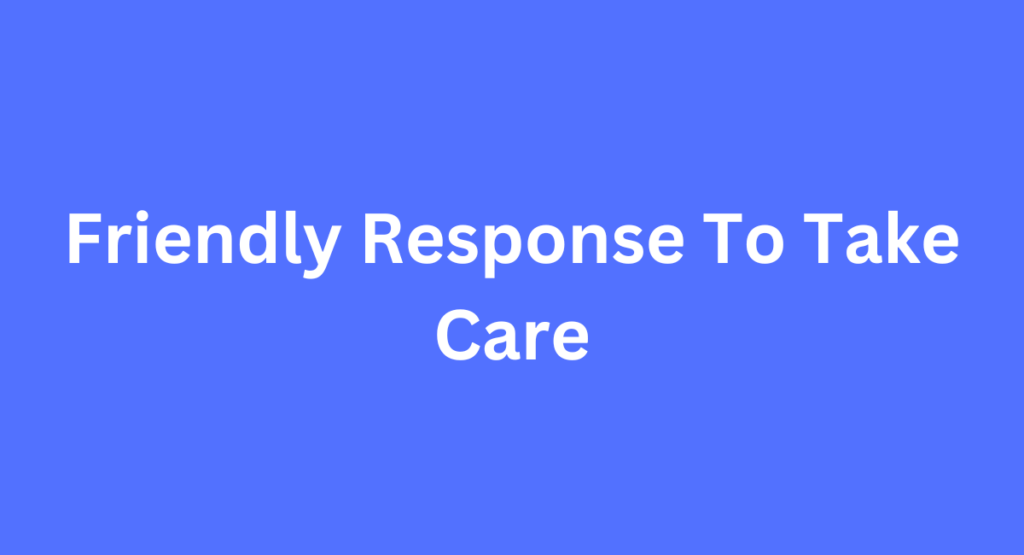
When someone tells you to “take care,” respond with a friendly acknowledgment, such as “You too” or “Thanks, I will. ” It’s a simple way to show that you appreciate their concern and care about their well-being.
When someone says “Take care” to you, it’s important to respond in a friendly and appropriate manner. Here are some ways you can respond warmly and genuinely:
- Thank you! I appreciate your concern and well wishes. : It’s always nice to know that someone cares about your well-being.
- You too! Take care as well. : Responding with a reciprocal gesture shows that you also have their best interests at heart.
- I will, thank you. : Acknowledge their concern and let them know that you will take their advice to heart.
- Likewise!: A simple and friendly way to let someone know that you wish them well too.
- I’ll be careful, thank you. : Show your gratitude for their concern while assuring them that you will take precautions.
Remember, responding in a friendly and appreciative manner is key when someone tells you to take care. These responses will help maintain a positive and caring interaction.
Frequently Asked Questions For How To Respond To Take Care
How Should You Respond To “Take Care”?
Respond by saying “Thank you, you too!” Or “I will, thanks!”. It’s a polite way to wish someone well and show you appreciate their concern.
What Does It Mean When Someone Says “Take Care”?
When someone says “take care,” they are expressing concern for your well-being and wishing you safety and good health. It’s a way to show they care about your welfare.
Is “Take Care” An Alternative To Saying Goodbye?
Yes, “take care” can be used as an alternative to saying goodbye. It is a way to express concern for someone’s well-being as you part ways.
How Should You Interpret The Phrase “Take Care” In A Text Message?
In a text message, the phrase “take care” typically signifies that the sender wishes for your well-being and wants you to stay safe and healthy.
Conclusion
Incorporating the phrase “take care” into our daily interactions is a simple yet powerful way to express genuine concern and support for others. By being mindful of the varying meanings of “take care” and responding with empathy and warmth, we can cultivate stronger connections and contribute to a more compassionate world.
